Search titles
Displaying results 11 to 20 of 87.
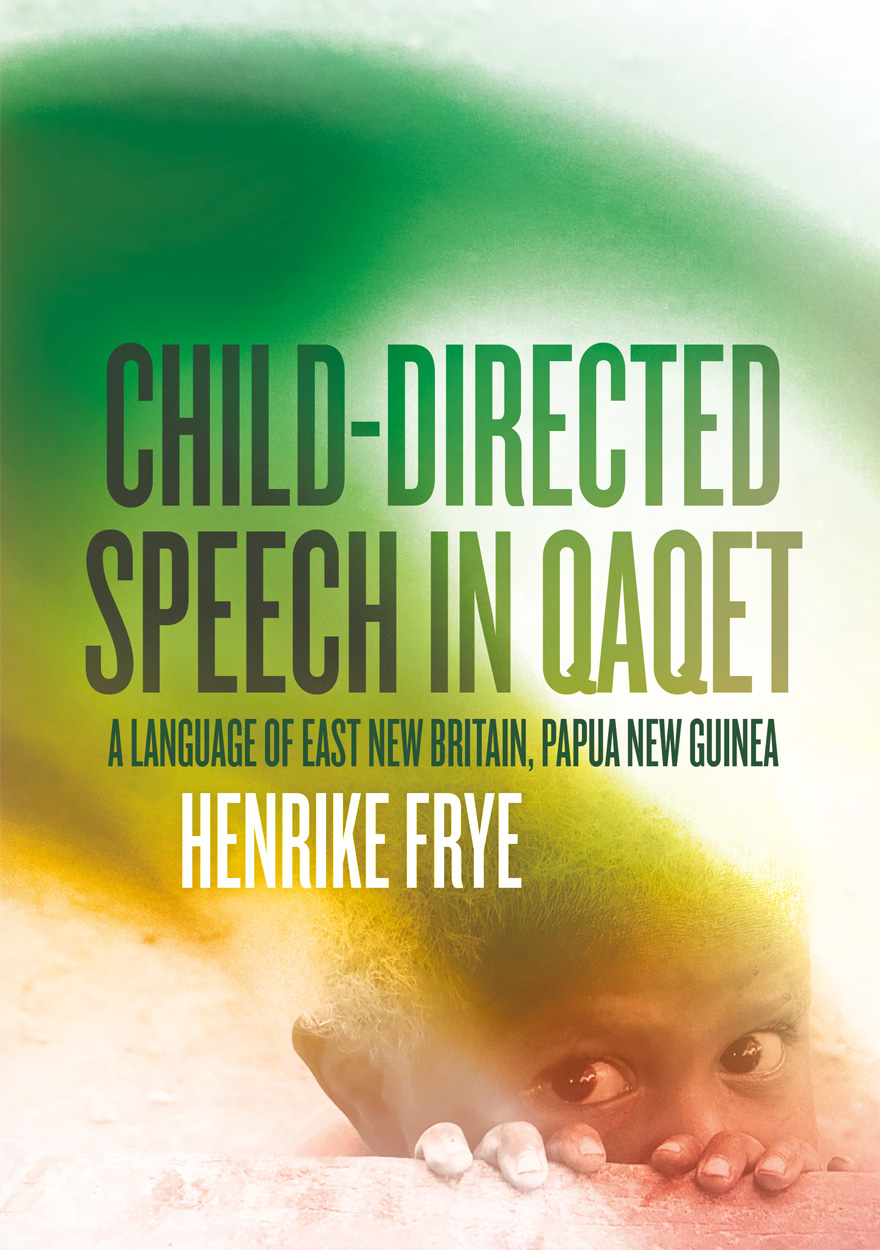
Child-directed Speech in Qaqet »
A Language of East New Britain, Papua New Guinea
Authored by: Henrike Frye
Publication date: August 2022
Qaqet is a non-Austronesian language, spoken by about 15,000 people in East New Britain, Papua New Guinea. In the remote inland, children acquire Qaqet as their first language. Much of what we know about child‑directed speech (CDS) stems from children living in middle‑class, urban, industrialised contexts. This book combines evidence from different methods, showing that the features typical for speech to children in such contexts are also found in Qaqet CDS.
Preliminary insights from naturalistic audio recordings suggest that Qaqet children are infrequently addressed directly. In interviews, Qaqet caregivers express the view that children ‘pick up’ the language on their own. Still, they have clear ideas about how to talk to children in a way that makes it easier for them to understand what is said.
In order to compare adult- and child-directed speech in Qaqet, 20 retellings of a film have been analysed, half of them told to adults and half to children. The data show that talk directed to children differs from talk directed to adults for several features, among them utterance type, mean length of utterance, amount of hesitations and intonation. Despite this clear tendency, there seems to be a cut-off point of around 40 months of age for several of those features from which the talk directed to children becomes more like the talk directed to adults.
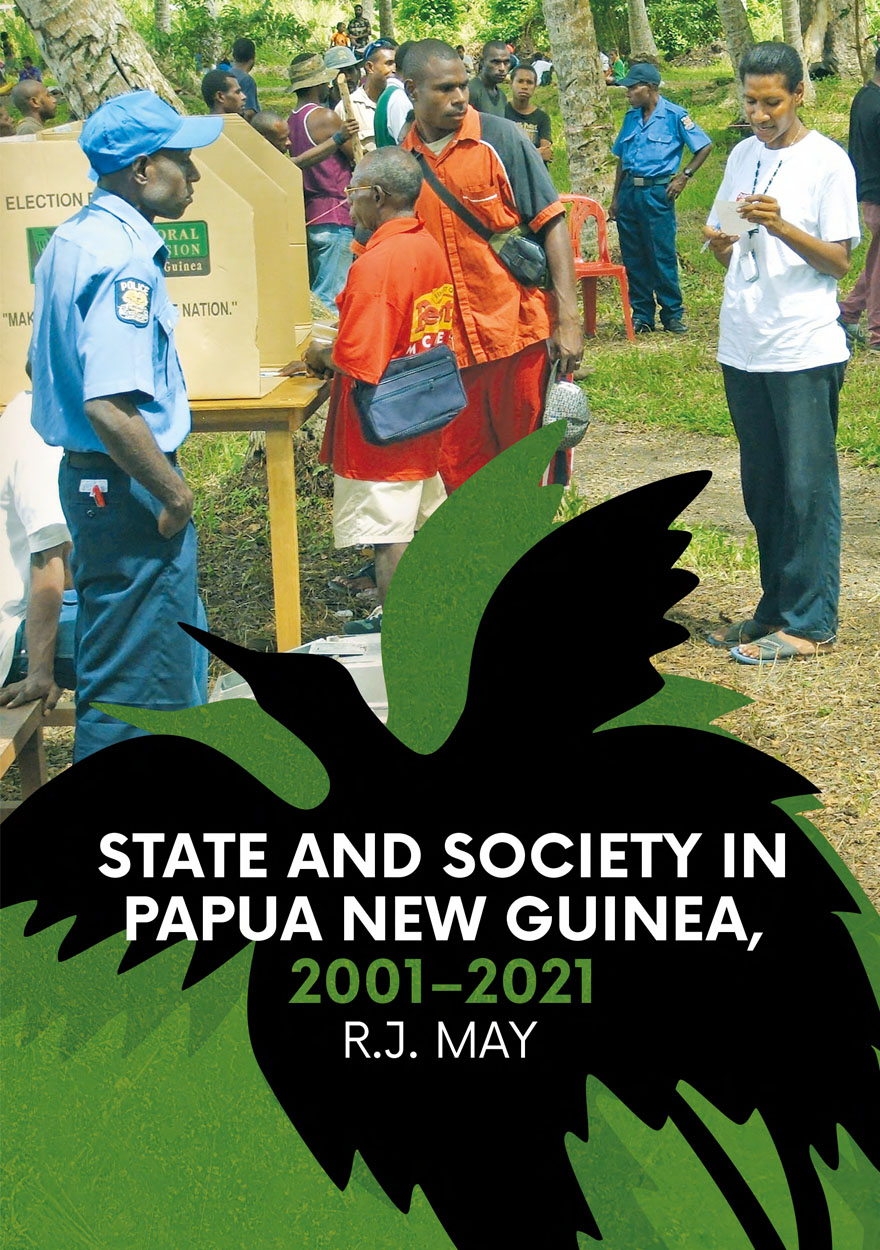
State and Society in Papua New Guinea, 2001–2021 »
Authored by: R.J. May
Publication date: August 2022
In a previous volume, State and Society in Papua New Guinea: The First Twenty-Five Years (2001, reprinted by ANU E Press in 2004), a collection of papers by the author published between 1971 and 2001 was put together to mark Papua New Guinea’s first 25 years as an independent state. This volume presents a collection of papers written between 2001 and 2021, which update the story of political and social development in Papua New Guinea in the first two decades of the twenty-first century.
The chapters cover a range of topics, from an evaluation of proposals for political reform in the early 2000s, a review of the discussion of ‘failing states’ in the island Pacific and the shift to limited preferential voting in 2007, to a detailed account of political developments from the move against Sir Michael Somare in 2011 to the election of Prime Minister Marape and his performance to 2022. There are also chapters on language policy, external and internal security, religious fundamentalism and national identity, and the sustainability of economic growth.
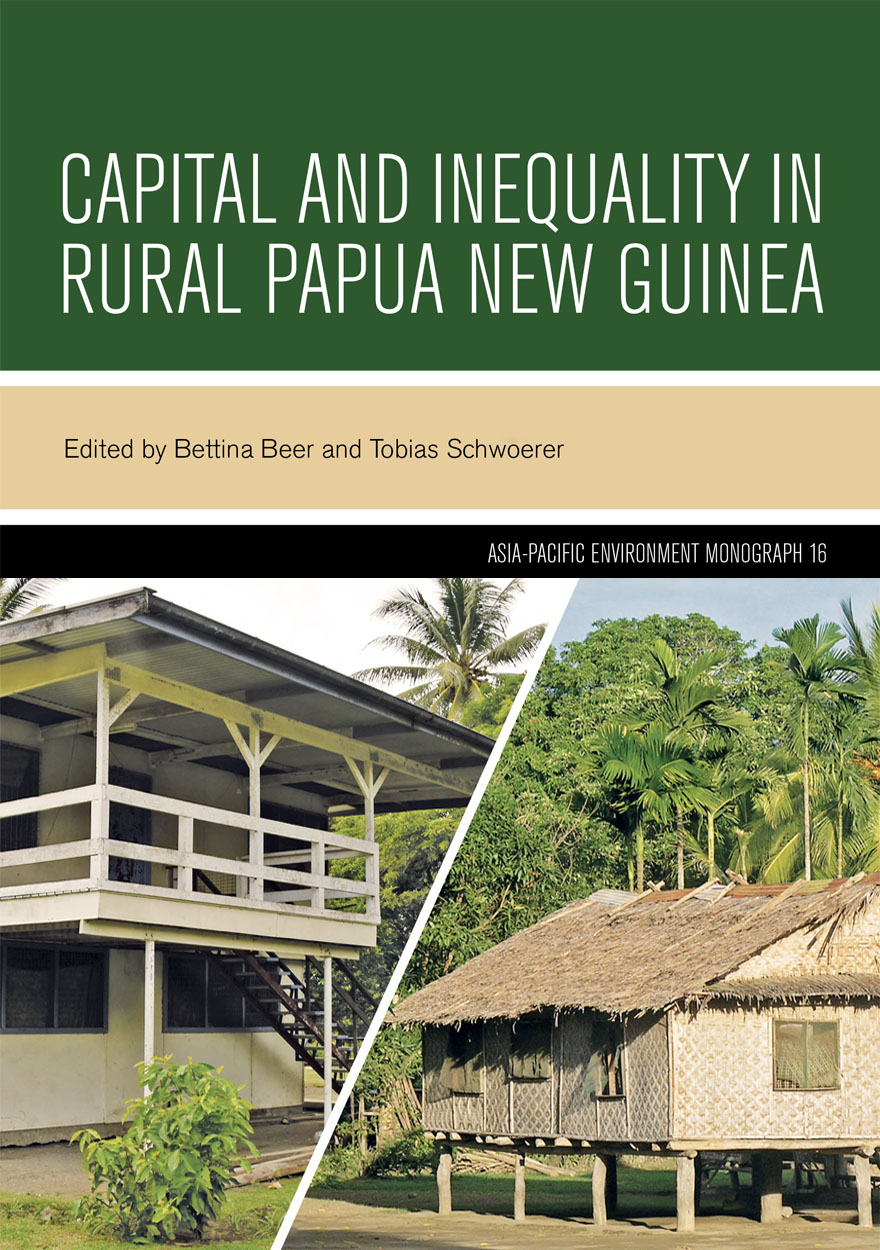
Capital and Inequality in Rural Papua New Guinea »
Edited by: Bettina Beer, Tobias Schwoerer
Publication date: July 2022
That large-scale capital drives inequality in states like Papua New Guinea is clear enough; how it does so is less clear. This edited collection presents studies of the local contexts of capital-intensive projects in the mining, oil and gas, and agro-industry sectors in rural and semi-rural parts of Papua New Guinea; it asks what is involved when large-scale capital and its agents begin to become significant nodes in hitherto more local social networks. Its contributors describe the processes initiated by the (planned) presence of extractive industries that tend to reinforce already existing inequalities, or to create and socially entrench novel inequalities.
The studies largely focus on the beginnings of such transformations, when hopes for social improvement are highest and economic inequalities still incipient. They show how those hopes, and the encompassing socio-political transformations characteristic of this phase, act to produce far-reaching impacts on ways of life, setting precedents for and embedding the social distribution of gains and losses. The chapters address a range of settings: the PNG Liquid Natural Gas pipeline; newly established eucalyptus and oil palm plantations; a planned copper-gold mine; and one in which rumours of development diffuse through a rural social network as yet unaffected by any actual or planned capital investments. The analyses all demonstrate that questions around land, leadership and information are central to the current and future social profile of local inequality in all its facets.
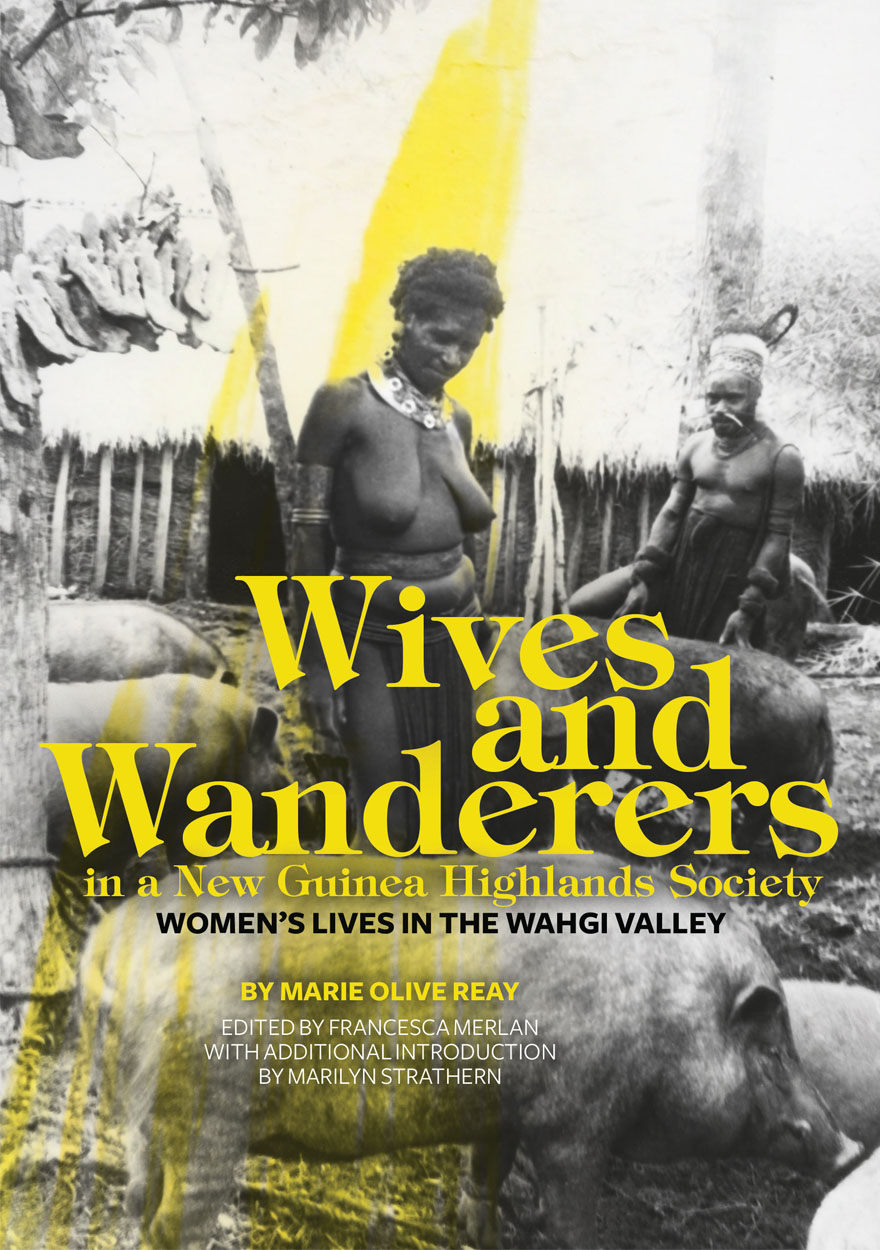
Wives and Wanderers in a New Guinea Highlands Society »
Women’s lives in the Wahgi Valley
Authored by: Marie Olive Reay
Publication date: January 2022
Wives and Wanderers in a New Guinea Highlands Society brings to the reader anthropologist Marie Reay’s field research from the 1950s and 1960s on women’s lives in the Wahgi Valley, Central Highlands of Papua New Guinea. Dramatically written, each chapter adds to the main story that Reay wanted to tell, contrasting young girls’ freedom to court and choose partners, with the constraints (and violence) they were to experience as married women.
This volume provides readable ethnographic material for undergraduate courses, in whole or in part. It will be of interest to students and scholars of gender relations, anthropology and feminism, Melanesia and the Pacific. The material in this book, which Reay had written by 1965 but never published, remains startlingly contemporary and relevant.
Marie Olive Reay was a social anthropologist who did research in Australian Indigenous communities and in the Wahgi Valley in the Central Highlands of Papua New Guinea. Employed at The Australian National University from 1959 to 1988 when she retired, Reay passed away in 2004. In 2011 this manuscript was found in her personal papers, reconstructed and edited by Francesca Merlan, augmented here by an additional introduction by eminent anthropologist of the Highlands, and of gender, Marilyn Strathern.
Had this manuscript appeared when Reay apparently completed it in its present form – around 1965 – it would have been the first published ethnography of women’s lives in the Central Highlands of Papua New Guinea. Its retrieval from Reay’s papers, and availability now, adds a new dimension to works on gender relations in Melanesian societies, and to the history of Australian and Pacific anthropology.

Wampar–English Dictionary »
With an English–Wampar finder list
Authored by: Hans Fischer, Bettina Beer
Publication date: December 2021
This ethnographic dictionary is the result of Hans Fischer’s long-term fieldwork among the Wampar, who occupy the middle Markham Valley in Morobe Province, Papua New Guinea (PNG). Their language, Dzob Wampar, belongs to the Markham family of the Austronesian languages. Today most Wampar speak not only Wampar but also PNG’s lingua franca, Tok Pisin. Six decades of Wampar research has documented the extent and speed of change in the region. Today, mining, migration and the commodification of land are accelerating the pace of change in Wampar communities, resulting in great individual differences in knowledge of the vernacular. This dictionary covers largely forgotten Wampar expressions as well as loanwords from German and Jabêm that have become part of everyday language. Most entries contain example sentences from original Wampar texts. The dictionary is complemented by an overview of ethnographic research among Wampar, a sketch of Wampar grammar, a bibliography and an English-to-Wampar finder list.

The Absent Presence of the State in Large-Scale Resource Extraction Projects »
Edited by: Nicholas A. Bainton, Emilia E. Skrzypek
Publication date: August 2021
Standing on the broken ground of resource extraction settings, the state is sometimes like a chimera: its appearance and intentions are misleading and, for some actors, it is unknowable and incomprehensible. It may be easily mistaken for someone or something else, like a mining company, for example.
With rich ethnographic material, this volume tackles critical questions about the nature of contemporary states, studied from the perspective of resource extraction projects in Papua New Guinea, Australia and beyond. It brings together a sustained focus on the unstable and often dialectical relationship between the presence and the absence of the state in the context of resource extraction. Across the chapters, contributors discuss cases of proposed mining ventures, existing large-scale mining operations and the extraction of natural gas. Together, they illustrate how the concept of absent presence can be brought to life and how it can enhance our understanding of the state as well as relations and processes forming in extractive contexts, thus providing a novel contribution to the anthropology of the state and the anthropology of extraction.
‘The Absent Presence fills a major gap in our knowledge about the relationship between states and companies – at a time when resource extraction seems to be more contested than ever. Bainton and Skrzypek have curated an incredibly impressive volume that should be read by all those interested in exploring corporate and state power, and the ever-present impacts of extraction. A highly recommended read.’
— Professor Deanna Kemp, Director of the Centre for Social Responsibility in Mining, The University of Queensland
‘Countless books have been written on the sovereign state and how it imposes a particular kind of order on economic and social interactions. What is original and compelling about this collection is the portrait of how two very different states converge when it comes to “extractive ventures”. From the presumption of exclusive sovereignty over mineral resources, to the bargains that are struck with major (often global) corporations, and the relative indifference to environmental impacts, there is a remarkable consistency in the patterns that are referred to as “state effects”. These effects are brought from the background to the foreground in this book through the blending of creative and critical thinking with detailed empirical research.’
— Tim Dunne, Pro-Vice-Chancellor and Professor of International Relations, The University of Queensland
‘This brilliant and intriguing title provides a timely contribution to understanding the actual functions and strategies of state (and state-like) institutions in resource arenas. The dialectics of presence-absence and its refractions at different levels and scales of government allow the authors to go beyond stereotypes about the (strong, weak, failed or corrupt) state, highlighting more commonalities than expected between Papua New Guinea and Australia, and even New Caledonia.’
— Dr Pierre-Yves Le Meur, Anthropologist, Senior Researcher, French National Research Institute for Sustainable Development, Joint Research Unit SENS (Knowledge Environment Society)
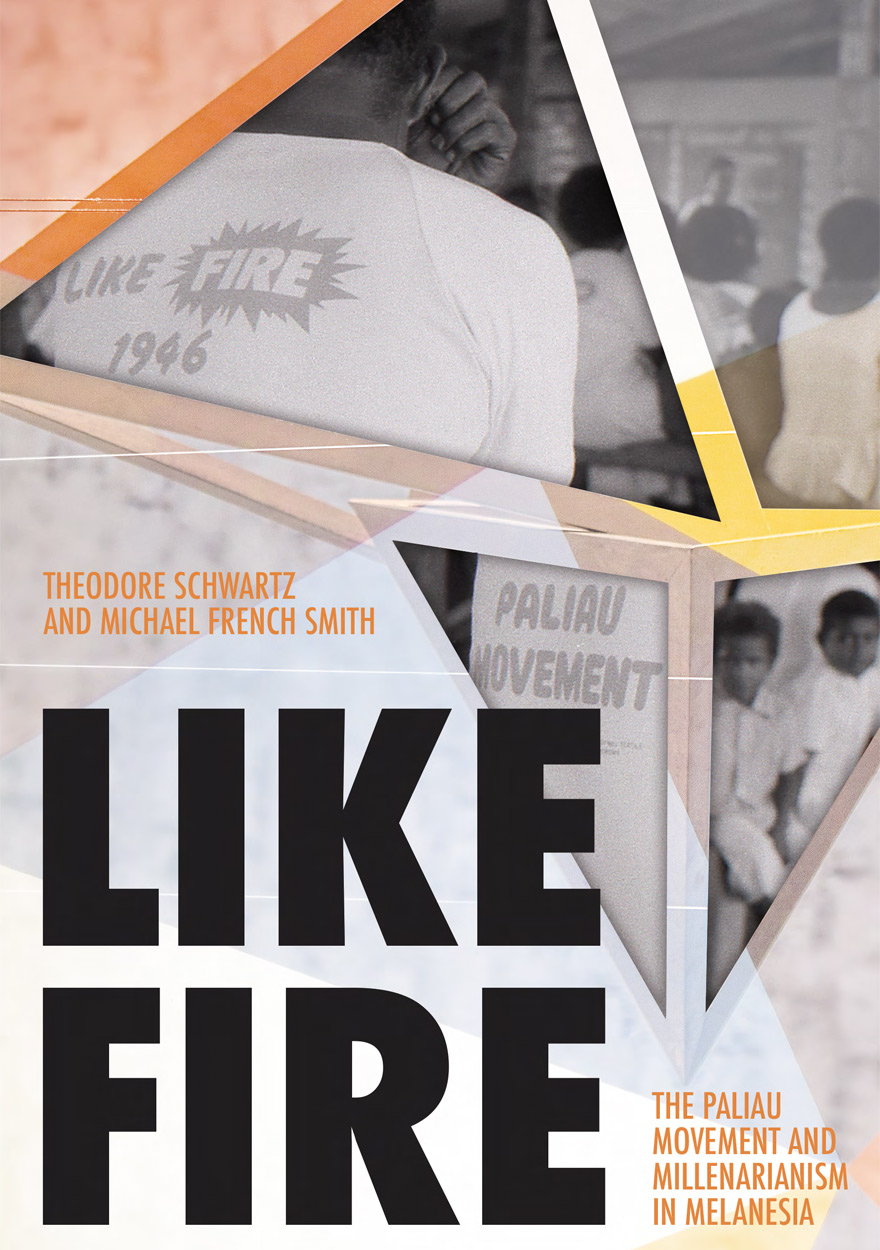
Like Fire »
The Paliau Movement and Millenarianism in Melanesia
Authored by: Theodore Schwartz, Michael French Smith
Publication date: July 2021
‘Like Fire consummates remarkable longitudinal ethnographic research on the Paliau Movement in Papua New Guinea, pursued from the 1950s into the 1990s by Theodore Schwartz, with Michael French Smith as his sometime assistant, and updated by Smith in 2015. The theoretical arguments are highly provocative and the book is well written and fascinating throughout. Like Fire poses important questions about the driving forces and contours of Pacific Island history and the place in it of cargo cults and other millenarian movements.’
—Aletta Biersack, Professor Emerita, University of Oregon
‘Like Fire synthesises old, but inaccessible, and new material on an important and long-lasting indigenous Melanesian movement, while making extensive use of the wider literature on cargo cults and millenarianism. I find the theorising in this book both very original and an important contribution to the debates on Melanesian religion, cargo cults, and millenarianism more generally. As the authors state, the topic of millenarianism has great relevance because of its ubiquity in the contemporary world.’
—Ton Otto, Professor of Anthropology, Aarhus University, Denmark, and James Cook University, Australia
Like Fire chronicles an indigenous movement for radical change in Papua New Guinea from 1946 to the present. The movement’s founder, Paliau Maloat, promoted a program for step-by-step social change in which many of his followers also found hope for a miraculous millenarian transformation. Drawing on data collected over several decades, Theodore Schwartz and Michael French Smith describe the movement’s history, Paliau’s transformation from secular reformer and politician to Melanesian Jesus, and the development of the current incarnation of the movement as Wind Nation, a fully millenarian endeavour. Their analysis casts doubt on common ways of understanding a characteristically Melanesian form of millenarianism, the cargo cult, and questions widely accepted ways of interpreting millenarianism in general. They show that to understand the human proclivity for millenarianism we must scrutinise more closely two near-universal human tendencies: difficulty accepting the role of chance or impersonal forces in shaping events (that is, the tendency to personify causation), and a tendency to imagine that one or one’s group is the focus of the malign or benign attention of purposeful entities, from the local to the cosmic. Schwartz and Smith discuss the prevalence of millenarianism and warn against romanticising it, because the millenarian mind can subvert rationality and nourish rage and fear even as it seeks transcendence.

A Sketch Grammar of Pondi »
Authored by: Russell Barlow
Publication date: July 2020
This book provides the first grammatical description of Pondi, a severely endangered language spoken by fewer than 300 people, almost all of whom live in a single village in the East Sepik Province of Papua New Guinea. Pondi is a non-Austronesian (i.e. Papuan) language, belonging to the Ulmapo branch of the Keram family. A Sketch Grammar of Pondi includes ethnographic information, with ample discussion of language vitality and endangerment. The grammatical description begins with phonetics and phonology, before turning to major and minor word classes. The description of nominal morphology focuses especially on Pondi’s irregular number affixation and stem alternation, while the description of verbal morphology is largely concerned with aspect and mood suffixation. Syntax is discussed both at the level of the phrase and at the level of the clause. Topics in syntax, such as questions, commands, negation and conditionals are discussed. Following the grammatical description, there is a lexicon of over 600 Pondi words, presented both as a Pondi-to-English word list and as an English-to-Pondi finder list.

Roars from the Mountain »
Colonial Management of the 1951 Volcanic Disaster at Mount Lamington
Authored by: R. Wally Johnson
Publication date: April 2020
Mount Lamington broke out in violent eruption on 21 January 1951, killing thousands of Orokaiva people, devastating villages and destroying infrastructure. Generations of Orokaiva people had lived on the rich volcanic soils of Mount Lamington, apparently unaware of the deadly volcanic threat that lay dormant beneath them. Also unaware were the Europeans who administered the Territory of Papua and New Guinea at the time of the eruption, and who were uncertain about how to interpret the increasing volcanic unrest on the mountain in the preceding days of the disaster.
Roars from the Mountain seeks to address why so many people died at Mount Lamington by examining the large amount of published and unpublished records that are available on the 1951 disaster. The information sources also include the results of interviews with survivors and with people who were part of the relief, recovery and remembrance phases of what can still be regarded as one of Australia’s greatest natural-hazard disasters.

A Doctor Across Borders »
Raphael Cilento and public health from empire to the United Nations
Authored by: Alexander Cameron-Smith
Publication date: February 2019
In his day, Raphael Cilento was one of the most prominent and controversial figures in Australian medicine. As a senior medical officer in the Commonwealth and Queensland governments, he was an active participant in public health reform during the inter-war years and is best known for his vocal engagement with public discourse on the relationship between hygiene, race and Australian nationhood. Yet Cilento’s work on tropical hygiene and social welfare ranged beyond Australia, especially when he served as a colonial medical officer in British Malaya and in the Mandated Territory of New Guinea. He also worked with the League of Nations Health Organization in the Pacific Islands and oversaw international social welfare programs for the United Nations. On one level, this professional mobility allowed ideas and practices of public health and government to circulate between colonial spaces of northern Australia, the Pacific Islands and Asia. On another, it meant that Cilento’s Pacific colonialism and colonial experience shaped his understanding of Australian national health and welfare. Rather than attempt a comprehensive biography of Cilento, this book instead uses this border-crossing career as a means to explore several material and discursive facets of Australia’s relationships to the Pacific and the world.



